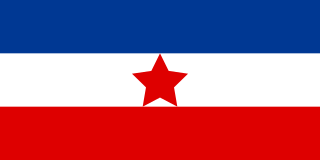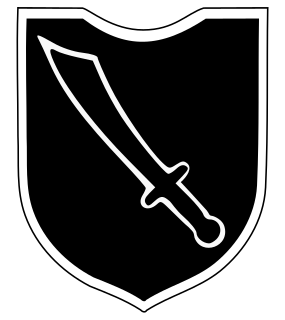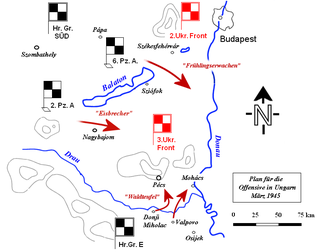Related Research Articles

The Yugoslav People's Army, also called the Yugoslav National Army, was the military of Yugoslavia from 1945 to 1992.
The Bleiburg repatriations occurred in May 1945, at the end of World War II in Europe. Tens of thousands of soldiers and civilians associated with the Axis powers fled Yugoslavia to Austria as the Soviet Union and Yugoslav Partisans took control. The British Army turned them back and forced them to surrender to Partisan forces. The soldiers and others were subjected to forced marches, together with columns captured by the Partisans in Yugoslavia. Tens of thousands of these men were executed; others were taken to forced labor camps, where more died from harsh conditions. The events are named for the Carinthian border town of Bleiburg, where the initial repatriation was conducted.

The Yugoslav Partisans, or the National Liberation Army, officially the National Liberation Army and Partisan Detachments of Yugoslavia, was the Communist-led resistance to the Axis powers in occupied Yugoslavia during World War II.
The Department for People's Protection or OZNA was the security agency of Communist Yugoslavia that existed between 1944 and 1952.

Sava Kovačević was a Yugoslav Partisan divisional commander during World War II, and one of the heroes of the communist Partisan movement.

The 13th Waffen Mountain Division of the SS "Handschar" was a mountain infantry division of the Waffen-SS, an armed branch of the German Nazi Party that served alongside but was never formally part of the Wehrmacht during World War II. From March to December 1944, it fought a counter-insurgency campaign against communist-led Yugoslav Partisan resistance forces in the Independent State of Croatia, a fascist puppet state of Germany that encompassed almost all of modern-day Croatia, all of modern-day Bosnia and Herzegovina as well as parts of Serbia. It was given the title Handschar after a local fighting knife or sword carried by Ottoman policemen during the centuries that the region was part of the Ottoman Empire. It was the first non-Germanic Waffen-SS division, and its formation marked the expansion of the Waffen-SS into a multi-ethnic military force. Composed of Bosnian Muslims with some Catholic Croat soldiers and mostly German and Yugoslav Volksdeutsche officers and non-commissioned officers, it took an oath of allegiance to both Adolf Hitler and the Croatian leader Ante Pavelić.

Petar Drapšin was a Yugoslav Partisan commander.
The Battle of Poljana was a battle of World War II in Yugoslavia. It started at Poljana, near the village of Prevalje in Yugoslavia, and was the culmination of a series of engagements between the Yugoslav Army and a large retreating Axis column, numbering in excess of 30,000 men. The column consisted of units of the German (Wehrmacht), the Armed Forces of the Independent State of Croatia, the Montenegrin People's Army, and Slovene Home Guard forces, as well as other fascist collaborationist factions and even civilians who were attempting to escape into British-controlled Austria. It took place after Nazi Germany officially surrendered on 8 May.

The Serbian Volunteer Corps, also known as Ljotićevci (Љотићевци) after their ideological leader Dimitrije Ljotić, was the party army of Zbor and collaborationist anti-Partisan military formation that was raised in the Territory of the Military Commander in Serbia during World War II. In July 1941, a full-scale rebellion by the communist Yugoslav Partisans and the royalist Chetniks erupted in the territory. The Germans pressured Milan Nedić's collaborationist government to deal with the uprisings under the threat of letting the armed forces of the Independent State of Croatia, Hungary, and Bulgaria occupy the territory and maintain peace and order in it. It was absorbed in the Waffen-SS in 1944 after evacuating to Slovenia, and in 1945 was rechristened the Serbian SS Corps

Military operations in World War II in Yugoslavia began on 6 April 1941, when the Kingdom of Yugoslavia was swiftly conquered by Axis forces and partitioned between Germany, Italy, Hungary, Bulgaria and client regimes. Subsequently, a guerrilla liberation war was fought against the Axis occupying forces and their locally established puppet regimes, including the fascist Independent State of Croatia and the Government of National Salvation in the German-occupied territory of Serbia, by the Communist-led republican Yugoslav Partisans. Simultaneously, a multi-side civil war was waged between the Yugoslav communist Partisans, the Serbian royalist Chetniks, the Croatian fascist Ustashe and Home Guard, Serbian Volunteer Corps and State Guard, as well as Slovene Home Guard troops.
Army Group E was a German Army Group active during World War II.

The Battle of the Transdanubian Hills was a defensive operation of the Bulgarian First Army during Bulgaria's participation in World War II against German Wehrmacht forces, who were trying to capture the north bank of the Drava river as part of Operation Spring Awakening.
Petar Gračanin - was a Serbian military commander in the Socialist Federal Republic of Yugoslavia and the Federal Republic of Yugoslavia.

The Belgrade Offensive or the Belgrade Strategic Offensive Operation was a military operation in which Belgrade was liberated from the German Wehrmacht through the joint efforts of the Soviet Red Army, Yugoslav Partisans, and the Bulgarian Army. Soviet forces and local militias launched separate but loosely cooperative operations that undermined German control of Belgrade and ultimately forced a retreat. Martial planning was coordinated evenly among command leaders, and the operation was largely enabled through tactical cooperation between Josip Broz Tito and Joseph Stalin that began in September 1944. These martial provisions allowed Bulgarian forces to engage in operations throughout Yugoslav territory, which furthered tactical success while increasing diplomatic friction.
Ernest Peterlin was a Slovene military officer who rose to a senior position in the Royal Yugoslav Army prior to the Second World War.Married to Anja Roman Rezelj. A decided anti-Communist, during the war he became a prominent anti-Partisan military leader and one of the main exponents of the pro-Western faction of the Slovene Home Guard, an anti-Communist collaborationist militia active in parts of German-occupied Slovenia between 1943 and 1945. In 1945, he was tried and sentenced to death by the new Yugoslav Communist authorities and executed in 1946.

The Partisan 9th Corps, was a formation of the Yugoslav Partisans during World War II. It consisted of division and brigade-size units, and operated in the Italian-annexed Province of Ljubljana, in Yugoslav territories under German civil administration, the Independent State of Croatia and northeastern Italy during World War II.

The 7th Army was a Royal Yugoslav Army formation raised prior to the German-led Axis invasion of Yugoslavia in April 1941, during World War II. It consisted of two divisions, two brigade-strength mountain detachments, and a brigade-strength infantry detachment. It formed part of the 1st Army Group, and was responsible for the defence of Yugoslavia's north-western frontier with Italy and Germany. Like all Yugoslav formations at the time, the 7th Army had serious deficiencies in both mobility and firepower.

The Battle of Batina or Batina Operation is one of the battles of the Second World War which took place from 11 to 29 November 1944 at the Croatian village of Batina in Baranja, on the right bank of the Danube River, between the units of the Red Army and the People's Liberation Army against the Wehrmacht and their allies. According to some estimates, the Battle of Batina is the biggest battle by the number of participants, the intensity of fighting, and the strategic importance that occurred during the World War II in Yugoslavia.
The 4th Army of the Yugoslav Partisans was a Partisan army that operated in Yugoslavia during the last months of the Second World War.
The 2nd Army of the Yugoslav Partisans was a Partisan army that operated in Yugoslavia during the last months of the Second World War.